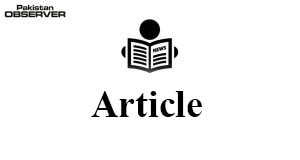Analects of confucius: Model of harmonious social code
THE Analects of Confucius — the compilation of 20 booklets (also termed as chapters) of ‘saying’ and ‘quotes’ attributed to Confucius and his contemporaries presents a model of harmonious social code.
The book is also a classic of world literature and first volume of anthology that has preserved the Confucian philosophy.
Confucius (551-479 BC) is one of the most prominent figures in the world history whose philosophy has influenced the people of the East Asian Civilization: China, Japan, Korea and Vietnam for more than two millennia. Confucianism is a set of rules deeply engraved in ethical doctrines of social order.
As an influential Chinese philosopher, political figure and educator, Confucius has emphasized over the role of filial piety (parental love) as the fundamental foundation for human goodness and actualization.
The philosophy has given somewhat esteemed status to the family institution for infusing the spirit of goodness in children from the early stages of life.
The model has recollected and unlocked the centuries old collective Chinese wisdom from the indigenous cultural heritage spanning over thousands of years.
The model has focused almost all aspects of life from social interaction to public service delivery, harmonious social order to spiritual nourishment, good governance to ethical behaviours and cultural institutions to human development.
The philosophy has patterned the state upon the family model. It has also played a significant role in the emergence of Chinese Civilization. Confucianism has deeply influenced the life of Chinese people as even today his philosophy is followed in the modern Chinese society.
His teaching had upheld the family structure supreme for individual’s training and grooming through rituals, ceremonies, reciprocity, filial piety (xiao), and celebrations.
The Confucius’s philosophy is more prescriptive than descriptive in nature due to short and condensed quotations.
Confucius has also introduced the reforms of meritocracy with the concept of noble birth and family status — authority should be given to people as per their ability and talent.
Thus after fighting the feudal system, he introduced the system of imperial examination structure in China as nobility of virtue was more important for him than nobility of blood.
The Confucian ethical doctrine has five ethical elements of social model based on ethical doctrines governing almost all relationships starting from father to son, husband to wife, elder to younger brother, ruler to the ruled and between friends.
Therefore, it was essential to have practical and specific hierarchy as per the rank, relation and age for all human interactions.
All actions of the individual members travel from one generation to the other, especially when virtues such as kindness, righteousness, propriety intelligence and faithfulness are practised within the family unit.
Similarly, Confucius has six virtues of humanity with essential beliefs in Ren (benevolence, humaneness toward others – the highest Confucian virtue), Li: (includes ritual, propriety, etiquette, etc), Xiao: (love within the family: love of parents for their children and of children for their parents) Yi:( righteousness), Xin:( honesty and trustworthiness) and Cheng: (loyalty to the state, etc).
According to Ho (1998) Confucianism could also play a significant role in bringing about a positive behavioral change in workplace environment in service delivery in almost all fields of life including education, health, transportation, tourism and hospitality.
Thus the Confucian philosophy helps ensure natural flow in service delivery for sustaining a harmonious environment.
Likewise, healthy relations could also be maintained through the ritualistic tradition of greetings, courteous behavior, bowing to superiors out of respect and standing of students for the teachers.
The domain of Confucianism has covered almost all aspects of life from family to education, individual morality to public rituals, education to politics, social interaction to public service, cultural to traditional landscapes, learning to teaching, public dealings to affection, sincerity to parental love.
The noble by doings or deeds was given preference over the noble by blood or race in the philosophy of Confucianism.
Though the Chinese term junzi (nobleman) means the son of prince but in the Analects, the word has a different connotation as it refers to the person who had developed in the Way (dao) and become an advanced human being by attaining the highest level by practising self-cultivation, justice, filial piety and honesty.
The book also covers a wide range of ethical concepts and moral code of Confucius such as “ren (“benevolence”), junzi (“the superior man”), tian (“heaven”), zhongyong (“doctrine of the mean”), li (“proper conduct”), and zhengming (“adjustment to names”). The Analects strongly upholds the pursuit of virtue as one of the supreme goals of life.
The philosopher has said that following the truth may not necessarily bring the immediate success or material gains but surely it would have long lasting and powerful spiritual rewards.
The model has also proved instrumental in shaping a law abiding nature of the Chinese people to follow the state laws. This has also made it easy for the emperors to govern the people and run the affairs of the state.
—The author is journalist based in Islamabad.










